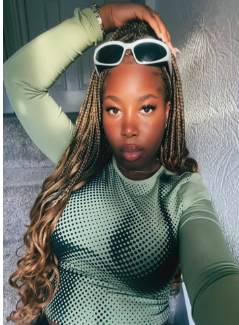Let’s Talk Sickle-Cell: Tolu
Ayo Ogundeyi
Tolu is from Nigeria but was born in the UK, lives in Stevenage and is 17 years old. She is currently in her last year of a-levels and is later looking at studying architecture in university. Her interests include photography, creating things and reading.
Tolu was diagnosed with Sickle Cell anaemia at birth. Tolu’s parents were both told they were AA when tested in Nigeria and discovered that they were in fact AS when they came to the UK so Tolu is SS. She realised she had sickle cell at about 5 years old with her first memory of a crises being at 6/7.
A crisis is when red blood cells cause blockages in the veins due to their sickled shape so a part of your body becomes restricted from blood and oxygen. This causes severe pain and sometimes requires a trip to A&E or urgent medical care- in which case an ambulance would be called.
During secondary school, the longest time she was absent was a month due to being in hospital. Despite her school being aware of her condition, they sent letters home to her parents who had to explain why she clearly wouldn’t be able to come to school.
There are 4 different types of sickle cell, and the medications and treatment options are specific for each person. Tolu is currently on hydroxycarbamide, penicillin, folic acid along with other supplements. Hydroxycarbamide changes the shape of the red blood cells from the sickled shape to the normal shape. She prefers this as if she were to take blood transfusions, she would be in and out of hospital and she’s not a fan of blood at all. She takes roughly 6 pills every morning.
She goes for regular blood tests to make sure the medications still work. At a point they stopped working and doctors suggested a bone marrow transplant in which her sister older sister Ola would be her donor. She was told she would have to freeze her eggs as the procedure can damage them and be on high doses of chemotherapy and may lose her hair. She ultimately decided against it as she was due to begin her GCSEs in a few months and the procedure meant she would have to drop out of school for a long time- she shared with me how emotional the whole ordeal was for her.
As many patients with sickle cell, her family actively advocate for her to be attended to as the nurses and doctors will walk past her when she’s crying out in pain as some of them don’t even understand what sickle cell is and all it entails. A frustrating misconception that comes with sickle cell is as it is an invisible disability-
As sickle cell disease is within the blood and cannot be seen on the skin, some doctors tend to think a crisis is not as bad as it really is, or it is a minor illness. It affects one’s everyday life, from the things they can do, eat and wear. She emphasised the fact that black people are not any better at handling pain is a misconception that has been passed down from previous generations.
Tolu only discloses her condition to those close to her and they are very understanding of it and the fact that she can’t go everywhere they can. If it’s too cold for example, she knows she cannot go out as she may be more at risk of having a crisis. As we discussed her future, she shared that she needs to be careful with dating as she cannot end up being with someone who also has sickle cell, so the conversation of genotypes will always come up. When I asked what spurs this on, understandably she doesn’t want her kids to go through what she did.
Her advice to those with sickle cell is “take care of your health and know you can’t do the same things everyone does”. To those who know someone with sickle cell, please be supportive and understanding.
For those wanting to find out more, the NHS website has information on sickle cell, google searches, American websites etc.
https://www.nhs.uk/conditions/sickle-cell-disease/
